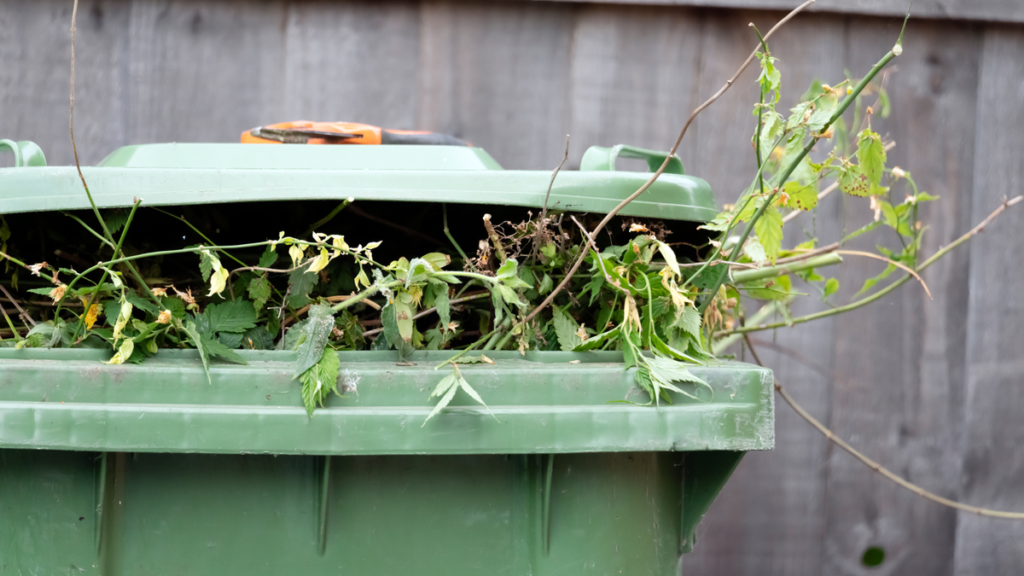Spring is the perfect time to work on your garden, and if you’re strimming, building or landscaping, you’ll probably have some waste to eliminate. But think twice before using your garden waste bin, as garden experts have revealed the five things you should never put in your garden waste bin and could land you a hefty fine if you do.
Like there are some things you should never put in a compost bin, there are a few items that should never see the inside of your garden waste bin.
‘If you repeatedly put the wrong items in your garden waste bin, then you may risk being charged a fixed penalty notice (FPN) of up to £80. This may fluctuate depending on your local council, but the maximum FPN for this offence is £80. Prior to being given an FPN, you will receive a written warning, failure to comply with this will result in a notice of intent, before receiving a final notice and fine,’ explains Ryan Kaila, category manager of waste and recycling at Kingfisher Direct.
Fines start at £80 but you could be fined upwards of £400 for repeat offences – so to avoid a hefty fine, these are the things you should never put in your garden waste bin.
1. Soil
This may come as a surprise to some but turf and soil are something you should always avoid putting in your garden waste bin. So before cracking on with any landscaping ideas, you should know how to correctly dispose of soil.
‘Unbeknownst to many, soil should never be disposed of in a garden waste bin. Soil is not considered a natural organic material, and it can potentially contain toxins that will contaminate compost. If you wish to dispose of soil, then you will have to take it to your household waste recycling centre. Always double check with your local council first to ensure that they accept soil,’ says Ryan.
2. Pet waste
‘Animal waste poses a health and safety risk. It can contain harmful diseases that present risks to plants, animals, and humans. Alongside this, animal waste requires a different composting process to normal garden waste, with higher temperatures needed to eradicate any bacteria. If you’re picking up after your pet, opt to put any waste in your general waste bin instead,’ explains waste management experts at BusinessWaste.co.uk.
Pet waste is never pleasant to deal with, and if cats keep pooping in your garden, there are measures you can take to prevent it, such as chooseing scents to deter animals from using your lawn as a toilet.
3. Japanese knotweed
Adding any invasive species to your garden waste bin is a big no-no, especially Japanese knotweed. You can even be prosecuted for allowing this invasive species to spread in the UK, which is why it’s so important you know how to get rid of Japanese knotweed.
‘Japanese knotweed is classified as controlled waste under the Environmental Protection Act 1990, which means that you are not allowed to dispose of it in your garden waste bin. Japanese knotweed is a highly invasive plant, which means that it requires special waste removal to ensure that it’s disposed of correctly. If the plant is disposed of improperly, it can result in its spreading, which is highly dangerous,’ says Ryan.
If you have Japanese knotweed on your property then you need to report it to the Environment Agency, who can advise on how to dispose it.
4. Food waste
‘Food waste can attract pests and vermin, meaning you should never put it into your garden waste bin. If your council offers a food waste caddy, use this instead. If not, you can either compost your food waste or, as a last resort, dispose of it with general waste,’ BusinessWaste.co.uk advises.
‘Putting any of the above materials in your garden waste bin at home counts as contamination. For the first instance, most councils will issue a warning, but repeat offences can be fined up to £100. If you continue to ignore this, the council will likely suspend your service altogether.’
Some councils will not accept organic food waste such as banana peel – but your compost bin will love this instead.
5. Bagged waste
‘Never place bagged waste inside a green bin, as bin bags are not decomposable and will therefore contaminate the compost. Even if bin bags are labelled as ‘compostable’, they will not decompose the same as garden waste, so it’s crucial to avoid this at all costs,’ says Ryan.
You don’t need to worry about bagging your garden waste either, as the bins are large enough to put your waste directly into them.
Shop garden waste disposal
Your actual garden waste bin will be allocated by the council. I’ve rounded up some handy products for transporting garden waste to your bin or a suitable disposal site.
If you have a large amount of garden waste to dispose of, these bags are ideal for tip runs.
Leaf Grabbers With Handles
These leaf grabbers are a handy tool for quickly collecting garden waste – leaves – from your garden.
Gdg Polymers 42 Litre Large Eco-Friendly Recycled Black Flexi Tub
This tub is a handy tool for transporting garden waste to your garden waste bin.
If you’re unsure of what you can put in your garden waste bin, your local council will be able to advise.
Read the full article here

